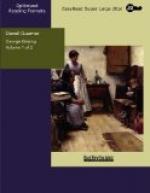Lying awake in the night, he thought with anything but satisfaction of the bargain to which he had pledged himself. To discover the woman who was by law his wife would undoubtedly be a good beginning now that he had every disposition to fix himself in a steady course, but he saw no advantage whatever in coming before a bench of magistrates and re-opening the story of his past. It would be pleasant to deal a blow at this man Quarrier; but, if Marks had told him the truth, Quarrier was in any case doomed to exposure. Was it not possible to act at once with prudence and with self-respect, to gain some solid benefit without practice of rascality? It involved breaking his word, but was he bound to keep faith with a man who proceeded on the assumption that he was ready for any base dealing? The money in his pocket he might find an opportunity of paying back. In this matter before him, he was undeniably an injured man. Lilian was treating him very badly indeed, very unfairly. If she chose to repudiate her marriage with him, it was her duty to afford him the chance of freeing himself from the legal bond. What moralist could defend her behaviour?
He worked himself into a mood of righteous indignation, of self-pity. No; the very least Lilian should have done, in uniting herself to another man, moreover a wealthy man, was to make some provision for her forsaken husband. That little income of hers should have been transferred to him. Her action was unexpected; he had thought her too timid, too religious, too soft-hearted, for anything of this kind. Since the disastrous wedding-day, she had, it was true, declined to hold communication with him; but he always looked forward to a meeting when he regained his freedom, and had faith in his personal influence. It was not solely for the sake of her money that he wooed and won her; other connections notwithstanding, he felt something like genuine tenderness for Lilian, and even now this sentiment was not extinct.
The morning only confirmed his reluctance to follow Mr. Marks’s directions. Practically, he lost nothing by taking his own course but a five-pound note. Let the electioneering agent attack Quarrier by some other means. For a few hours, at all events, the secret would remain unpublished, and in that interval the way might be opened for an honest and promising career.
He breakfasted substantially, and left by the train appointed. Arrived at Polterham, after a walk up and down the nearest streets and an inspection of the party placards, he asked his way to the shop of Mr. Ridge, bookseller. At once he was directed thither.
“So far so good,” he said to himself. “It seems pretty certain that Marks has not misled me. Shall I go into this shop, and play the trick that was recommended? I think it is hardly worth while. Better to inquire for Quarrier’s house, and have a look at it.”
He did so, and—it may be mentioned—on his way passed the doors of the church in which at that moment Glazzard was being married. At about half-past ten he was in sight of the high wall surrounding Quarrier’s garden; he approached the gate, and cautiously took a view of what was within, then walked to a little distance.




